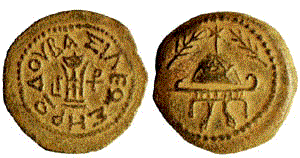Sire of the Herodian
dynasty that played a pivotal role in eastern Mediterranean politics
during the first century of Roman domination. The second
son of Antipater
II became one of the
shrewdest & most ruthless political leaders in Jewish history.
His father appointed him field-marshal [stratégos] of Galilee
(47
BCE). He soon demonstrated his aggressiveness
& decisiveness by capturing & executing Hezekiah, a rebel
Jewish bandit chief who was raiding Roman supporters in Galilee
& southern Syria. This incident also demonstrated his refusal to
submit to Jewish religious authority, when he scorned the
Sanhedrin's attempt to sentence him for having executed Hezekiah
without a trial.
Julius
Caesar's assassination (44 BCE) & his own father's murder
(43 BCE) catapulted Herod into
prominence in the eyes of Rome. After pacifying Samaria
he drove the anti-Roman Hasmonean, Antigonus,
from Jerusalem
(42 BCE). Driven himself from Jerusalem by Antigonus' Parthian
allies (40 BCE), Herod took his cause to the Roman Senate. There
Caesar's heirs, Marc
Antony & Octavian,
convinced fellow Romans to appoint Herod "King of the
Judeans" (39 BCE)
to counter Antigonus' right to the title that
the Parthians had awarded him. During the ensuing civil war, Herod
solidified his right to rule Jews by marrying Mariamne,
the grand-daughter of Hyrcanus
II, the Hasmonean high-priest
whom Antigonus had deposed. Herod again took Jerusalem after a
bitter siege & bribed Marc Antony to execute Antigonus.
After winning undisputed political control of Jewish territory,
Herod worked to pacify the populace with a double-edged policy of
suppression of all opponents & political & economic favors
for supporters. His tactics of terror to deny civil liberties &
public dissent anticipated the methods adopted by some later Roman
emperors & modern police states.
When civil war broke out between the Roman strongmen, Octavian &
Antony, Herod remained an ally of Antony. But when Antony was
defeated at Actium
(31 BCE),
Herod managed to convince Octavian that
he was the best possible ally to rule Palestine. Engaging in one of
history's most ambitious & lavish building campaigns, Herod
built cities [Caesarea
Maritima & Sebaste]
to honor his new Roman patron, fortresses [Herodium &
Masada]
to protect the Judean frontier, & lavish palaces for himself. He
also began to renovate Jewish shrines [the tombs of the patriarchs
at Hebron
& the temple at Jerusalem] to glorify both the Hebrew God &
himself. The Roman emperor Augustus [Octavian] in turn rewarded him
by three times granting him control of non-Jewish territory: Samaria
& the Gaza
strip (30 BCE), Batanea &
Trachonitis in Syria, south of Damascus (23 BCE),
Iturea & the Golan,
from the heights east of the Sea
of Galilee north to the headwaters of the Jordan river in the
Lebanese mountains (20 BCE).
The extent of his kingdom rivaled that of David, almost a millennium
earlier. Augustus himself publicly proclaimed him "friend &
ally of Caesar."
As he aged, however, Herod became increasingly unstable. His
youthful experiences of treachery by opponents & himself,
magnified by a temper that tolerated no slight or potential rival,
led him to destroy even his closest associates. At the height of his
prosperity, false rumors & unsubstantiated suspicions led him to
eliminate members of his own family. Jealousy & political
ambition had led him to murder his beloved Mariamne
(29 BCE) &
all her relatives except their two
sons, only to later order
even them executed on false charges of treason
(7 BCE). From his own
deathbed (4 BCE) he ordered
the execution of his eldest son, Antipater
III. But the greatest
demonstration of his irrational rage, was his reaction to the
attempt of religious students to rid his newly renovated temple of a
golden (Roman) eagle & other decorations that they deemed
contrary to Torah.
Instead of just punishing the youthful offenders, he executed their
teachers, arrested the elders of every town in his kingdom & as
his last command ordered their execution to teach Jews not to oppose
him. Only the decision of his sister,
Salome,
to countermand this order prevented the Jewish reaction to Herod's
tyranny from exploding into immediate public rebellion.
Some modern scholars see Herod's descent from military &
political brilliance into anti-social madness as evidence of
arteriosclerosis, paranoia, megalomania or various other medical
& psychological disorders. But, whatever the cause, the effect
of his vengeful instability was to plunge Jews & Romans deeper
into a whirlpool of repression & counter-violence that
influenced the direction of western history.
References: Josephus,
Antiquities
16.228-404;
17.3-133,
139-151,
164-211,
233, 238-249.
_____, War
1.19-20,
64,
203-215,
221-673;
2.5-7.
Cassius Dio, Roman
History
49.22.
Other resources on line:
![]()
![]()

![]()
![]()
![]() Perspective on the
World of Jesus
Perspective on the
World of Jesus ![]()